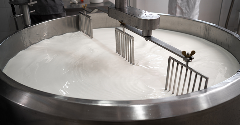News
Arla helps improve DR Congo nutrition
7 Jul 2016Arla Foods Ingredients has been exploring how to improve the staple diet of low-income consumers in DR Congo without raising the price.

Arla Foods Ingredients has been exploring how to improve the staple diet of low-income consumers in DR Congo without raising the price.
A field study of low-income families in the Democratic Republic of Congo has found an opportunity to improve the nutritional quality of the staple diet at very little cost, the company reports. The opportunity lies in fufu, a traditional cassava and maize flour dish that is widely consumed every day.Through the addition of 10% dairy ingredients, fufu could become a daily source of milk protein and minerals, according to Arla who note that, at an estimated extra cost of $7.50 per tonne, the increase in the kilo price of fufu is minimal.DR Congo is one of the poorest countries in the world. According to the World Food Programme, in 2014 23% of children under the age of five and 14% of women were underweight, almost 50% of the under-fives were stunted, and more than half a million pregnant or breastfeeding women suffered from acute malnutrition.To investigate the potential to improve this situation using dairy ingredients, Arla Foods Ingredients conducted interviews with 30 consumers living in the DR Congo capital, Kinshasa earlier this year. This revealed that an average household includes four children and spends $6 a day on food.All but one of the people interviewed stated that they consume fufu at least once a day. The exception was a woman who prepared fufu for her family but did not eat it herself.“Fufu is part of the staple diet in many African countries. In the Congo, men say they have to eat it every day otherwise they can’t sleep. People know fufu is not very nutritious but it keeps them from going hungry,” said Man Kasiama Ebaba, who conducted the study for Arla Foods Ingredients.Application trials in the Arla Foods Ingredients laboratory have shown that the addition of skimmed milk powder and whey permeate can enrich the protein and mineral content of fufu without altering the overall taste and texture.“The taste is slightly sweeter but, in our small-scale tests with people who eat fufu regularly, likeability was high,” Man Kasiama Ebaba said. “Our conclusion is that fufu has strong potential for enrichment at no significant extra cost to consumers.”During his fact-finding trip to DC Congo, Ebaba approached several companies to gauge local interest in producing a nutritionally-enriched fufu. These discussions are ongoing.Prior to the DC Congo study, Arla Foods Ingredients conducted a similar investigation of affordable food opportunities in Bangladesh.“The affordable food segment represents an opportunity for us to pursue our responsible business goals. We are currently developing new business models for the supply of sustainable, low-cost solutions that give low-income consumers better access to good nutrition,” said senior project manager at Arla Foods Ingredients, Charlotte Sørensen.Arla Foods Ingredients is a member of the GAIN Nordic Partnership, which aims to develop affordable and nutritious foods in partnership with local manufacturers.Related news

Consumers dislike faba beans’ sensory profile
3 Jun 2024
Consumers display low acceptance of faba beans, with sensory properties such as bitterness a core concern, a study suggests. However, for product varieties such as cocoa-free chocolate, this attribute could prove to be a benefit.
Read more
Food scientists uncover new way to preserve nutrient and flavour quality
29 May 2024
Researchers have developed a method that guarantees food safety for low-moisture products, such as dried milk, while maximising quality by retaining vitamins, minerals, and flavours, they say.
Read more
FDA scrutinizes milk pasteurisation over HPAI risk
28 May 2024
The US Food and Drug Administration (FDA) is undertaking additional scientific research work to ensure that approved pasteurization processes are rigorous enough after retailer milk tests showed contamination from Highly Pathogenic Avian Influenza (HPA...
Read more
Magnum targets ice cream lovers’ moods with new flavours
2 May 2024
Unilever-owned Magnum has released a suite of “mood-inspired flavours” as the 2024 ice cream season kicks off. The offerings, marketed as the Magnum Pleasure Express, are Magnum's first foray into the “mood-food” category.
Read more
The eight global food trends shaping the future of dining
23 Apr 2024
Unilever’s Future Menu Trend 2024 report identifies the global food trends shaping the food service industry, providing insights into changing consumer preferences that could provide inspiration for packaged food and drink brands.
Read more
Report outlines how the US interfered with marketing restrictions on formula across the globe
18 Apr 2024
A recent investigative report by ProPublica unmasked the extensive interference by the US government in international regulations concerning the marketing of formula.
Read more
Ultra-processed food intake in South Africa at concerning levels, study suggests
19 Mar 2024
As South Africa considers introducing front-of-pack warning labels and strict marketing limits for unhealthy foods, research has found that low-income South Africans get around half of their calories from ultra-processed foods (UPFs) – “a cause for con...
Read more
India’s mithai market develops new ingredient and flavour profiles
18 Mar 2024
Mithai is a hugely popular dessert and sweet snack in India and manufacturers are experimenting with unique ingredients, new flavour combinations, and healthier versions to capture new audiences.
Read more
Unilever and Perfect Day’s animal-free dairy dessert: Is precision fermentation the future of dairy?
6 Mar 2024
Perfect Day, a precision fermentation dairy supplier, has partnered with Unilever's Breyers, a brand of ice cream and frozen dairy desserts, to launch Breyers lactose-free chocolate frozen dessert.
Read more
Macauba oil emerges as potential rainforest-friendly palm oil alternative
1 Mar 2024
Producers and researchers consider the rainforest-friendly credentials of Macauba palm oil and whether its sustainability credentials offer an opportunity to replace palm oil.
Read more